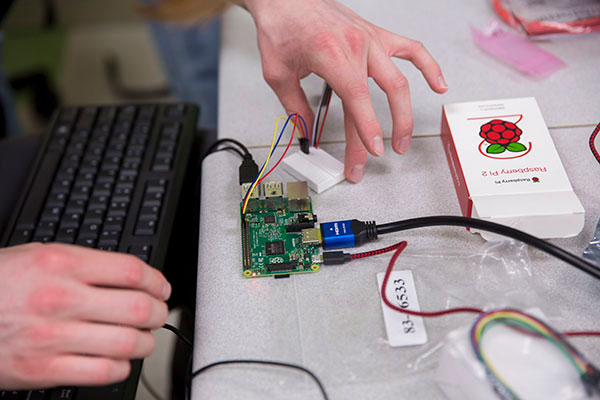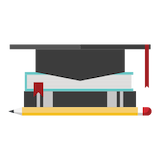It's easy to start your application.
Master's & Certificate Programs
MS in Electrical Engineering
Learn how you can earn a MS in electrical engineering at the McKelvey School of Engineering.

Go further in your career with a master's in electrical engineering. Graduate with the knowledge, skills and personal network you'll need to succeed.
The Master of Science in Electrical Engineering (MSEE) is a progressive academic master's degree designed mainly for both full-time and part-time students interested in proceeding to the departmental full-time doctoral program and/or professional practice in an industrial career. Our program provides students with the flexibility to specialize in different aspects of the field of electrical engineering while working closely with faculty members in the department.
The Department of Electrical & Systems Engineering looks for students who have a solid undergraduate background in electrical engineering and a desire to progress further into the field. Many students in the program pursue independent research as a part of their degree by working in a research lab with a faculty member. To support research efforts, the department provides master’s students with state-of-the-art research equipment and the considerable resources offered by a great university.
Students who earn their MSEE gain a competitive edge over their peers, working in fields such as system design and specification; university teaching and research; sales; cost analysis; management; component design, research, and development; and consulting, production, and quality control.
Suggested Academic Requirements for Prospective Students
It is recommended that incoming students earn a baccalaureate degree in engineering or another STEM-related degree. In earning that degree, it is recommended that students take the following upper-level courses:
- Calculus Sequence and Differential Equations
- Probability and Statistics
- Engineering Mathematics
- Matrix Algebra
- Physics
- Introductory Computer Science
- Signals and Systems
- Circuits/ Electrical Networks
The following courses are also important in the curriculum but are emphasized to a different extent in each of the key areas within the program. Students lacking this content may find it helpful to add it after admission.
Invest in Yourself
"WashU’s campus makes the impossible feel possible. It is a campus that takes on big ideas. This culture challenges you as a student, but it also makes you strive for more. This mindset has helped me tremendously when joining industry. The master level course challenged me to understand challenging concepts at a level that I did not expect. The skills and understanding that I gained from my course work have been invaluable to my skillset as an engineer. Engineers are supposed to tackle the world’s biggest problems; WashU helped me feel like I am prepared to do so.
WashU is regarded as a top-notch institution. This reputation helped me to establish and develop the beginnings of my professional career. The faculty contributed to my education both in terms of helping me develop my technical abilities and in terms of refining my passions. The willingness to confidently take on challenging projects has helped me continue to learn and grow as an engineer since graduation."

William (Billy) Gardner, MSEE Alumni
Degree Requirements for Current Students
The Master of Science in Electrical Engineering is an academic master's degree designed mainly for both full-time and part-time students interested in proceeding to the departmental full-time doctoral program and/or an industrial career. Students pursuing the degree Master of Science in Electrical Engineering (MSEE) must complete a minimum of 30 units of study consistent with the residency and other applicable requirements of Washington University and the McKelvey School of Engineering and subject to the following departmental requirements:
- A minimum of 15 of the total 30 units must be selected from the Degree Requirement list below for core electrical engineering subjects taught by the Department of Electrical & Systems Engineering (ESE).
- A maximum of 6 credits may be transferred from another institution and applied toward the master's degree. Regardless of the subject or level, all transfer courses are treated as electives and do not count toward the core requirements for the degree.
- Regardless of subject or level, all transfer courses are treated as electives and do not count toward the core requirements for the degree.
- ESE 590 Electrical & Systems Engineering Graduate Seminar must be taken by full-time graduate students each semester. This course is taken with the unsatisfactory/satisfactory grade option.
- The remaining courses in the program, listed in the Degree Electives list below, may be selected from senior or graduate-level courses in ESE or elsewhere in the university.
- Courses outside of ESE must be in technical subjects relevant to electrical engineering and require the department's approval.
- Undergraduate Laboratory courses may not be used to satisfy this requirement.
- The degree program must be consistent with the residency and other applicable requirements of Washington University and the McKelvey School of Engineering.
- Students must obtain a cumulative grade-point average of at least 3.0 out of a possible 4.0 overall for courses applied toward the degree. Courses that apply toward the degree must be taken with the credit/letter grade option.
Either a thesis option or a course option may be selected. The special requirements for these options are as follows:
- Thesis Option: This option is intended for those pursuing full-time study and engaged in research projects. Candidates for this degree must complete a minimum of 24 units of course instruction and 6 units of thesis research (ESE 599); 3 of these units of thesis research may be applied toward the 15 core electrical engineering units required for the MSEE program. Any of these 6 units of thesis research may be applied as electives for the MSEE, MSSSM, and MSDAS programs. The student must write a master's thesis and defend it in an oral examination.
- Course Option: Under the course option, students may not take ESE 599 Master's Research. With faculty permission, they may take up to 3 units of graduate-level independent study.
Degree Requirements
| Course Number | Course Name |
|---|---|
| ESE 415, 513 | Optimization |
| ESE 520-529 | Applied probability category |
| ESE 530-539 | Applied physics and electronics category |
| ESE 540-549 | Control category |
| ESE 550-559, 5590-5599 | Systems category |
| ESE 560-569 | Computer engineering |
| ESE 570-579 | Communications category |
| ESE 580-589, 591-596, 5931-5933 | Signal and image processing category |
| ESE 599 | Master's research (thesis-option only) |
All full-time graduate students are required to take ESE 590 Electrical & Systems Engineering Graduate Seminar each semester. This course is taken with an unsatisfactory/satisfactory grade option.
Refer to the University Bulletin for specific requirements.
Degree Electives
Any course numbered 401 or greater in the Engineering (with the prefix of BME, CSE, EECE, ESE, or MEMS), Physics or Mathematics department, excluding the exceptions listed below, are approved by the department as electives.
Students may take either ESE 417 or CSE 417T, but they may not use both as electives for the degree.
For students who have already taken ESE 318 & 319, ESE 501 may not be used as an elective for graduate credit.
Additionally, the following courses are NOT approved by the department as electives. Requests for an exception to this policy may be submitted to the graduate program coordinator with the approval of the student's academic advisor.
| Course Numbers | Unapproved Electives |
|---|---|
| CSE 501N, 504N, 505N | |
| CSE 465M EECE 405, 421, 424, 425 ESE 435, 447, 449, 465, 488, 4480, 4481 MEMS 405 |
Undergraduate lab courses |
| ESE 400, 497, 498, 499 | Any undergraduate research, independent study, senior design or capstone course |


